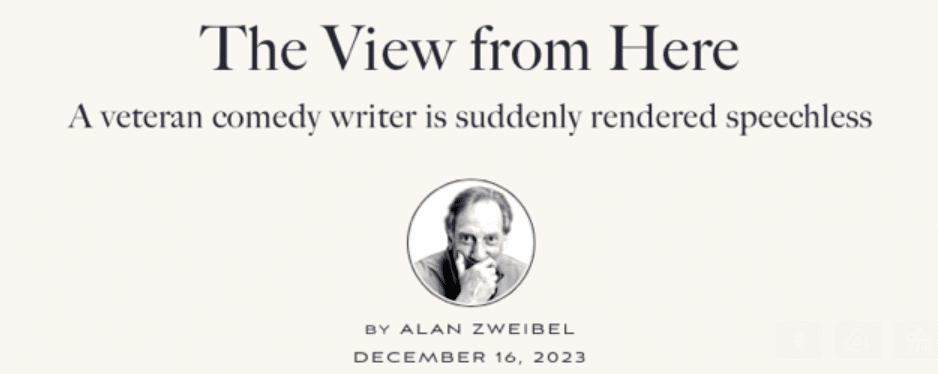I’m a writer. A Jewish comedy writer. I know, hardly a rarity. In fact, one of the most oft-asked questions I get during the Q&A portion of speaking engagements is why I think Jews have always been so prominent in the world of comedy.
Indeed, the numbers are staggering. Because in every corner of literature, vaudeville, film, radio, and television, not to mention nightclub and theater stages, contributions by Jews have eclipsed their percentage of the population by far.
My cliché answer? Humor is a mindset—a coping mechanism, if you will—that has enabled us to survive the persecution we’ve withstood through the centuries. A deflection of sorts from the horrors of pogroms, expulsions from so many countries, the Holocaust, and the more subtle gentlemen’s agreements that tacitly made it impossible for a Jewish family to move into certain communities. As my friend Rob Reiner said when asked what was at the root of Jewish comedy: “Fear.”
For the most part, this fear occurred before I was born. So, while I listened politely to my grandparents, who fled the shtetls of Europe and immigrated to this country in search of opportunity, it was academic. I regarded their stance—that whenever there’s trouble in the world, the Jews will ultimately be blamed—as paranoia.
I thought it was understandable. They had lived through it. Yet I had an emotional detachment. I grew up in an assimilated time when a lot of my Jewish friends were admitted to Ivy League schools, people of all religions were using the word “schmuck,” and Sandy Koufax was nationally applauded for refusing to pitch the opening game of the 1965 World Series because it fell on Yom Kippur. I considered myself the beneficiary of the pains previous generations had endured and the sacrifices they had made. I had the luxury of being able to look out at the unthreatening world around me and make a living by joking about it.
Then came October 7—when the fear became present. When the unheeded warnings relegated to the past visited us with an unannounced vengeance. When the 78-year-old vow made after the liberation of Auschwitz of “Never again!” came rushing forward, and we realized that “again” was now.
I grew up in an assimilated time when a lot of my Jewish friends were admitted to Ivy League schools, people of all religions were using the word “schmuck,” and Sandy Koufax was nationally applauded for refusing to pitch the opening game of the 1965 World Series because it fell on Yom Kippur.
It was also the day I found it impossible to focus on my work. As if it would be blasphemous to even look for anything funny when such savagery was rendered upon so many who were doing nothing more than enjoying their lives.
Television was my drug of choice. I watched continually as every day presented a new beat in an unfolding war story. Maps and military strategy found their way into dinner conversations with friends. So did the thoughts of a country the size of New Jersey possibly fighting a war on multiple fronts. As did the discovery of a Hamas command base in the tunnels below Gaza hospital.
As upsetting as it was, no matter how many times I promised myself I’d stay away, I’d wake up in the middle of the night, go into my home office, turn on the news, and learn, for instance, that a man named Paul Kessler died after being hit over the head with a megaphone at a pro-Israel demonstration in Los Angeles. And find out just how prevalent the spread of anti-Semitism at those very same universities my friends had gotten into was. Like the rally flaunting swastikas with chants of “Heil Hitler!” outside a dorm at a Midwestern state university.
Or Osama bin Laden’s letter, justifying his attack as a response to America’s support of Israel, getting millions of likes on TikTok, in great part from young people who get their information on fast-paced apps designed to allow bits of information to go viral without context. Or validity. And though the first instinct of the comedy writer in me is to marvel at the ingenious lines constructed by supreme wits like Groucho Marx and Dorothy Parker, it was the words of the Italian writer and Holocaust survivor Primo Levi that were now resonating:
“Monsters exist, but they are too few in numbers to be truly dangerous. More dangerous are … the functionaries ready to believe and act without asking questions.”
Which exemplifies another war of sorts, the one between the conflicting narratives being advanced on different TV channels or from one social-media site to another. I no longer know how to react to the varied editorial slants and misinformation masquerading as reportage. Last weekend my wife, Robin, and I were in a restaurant, and the two couples at the table next to ours were vehemently arguing over the hostage exchange with four different sets of “facts.”
In my quest for actual facts, I turn to Web sites such as People4Peace.net and the American Jewish Committee. A few weeks ago, I live-streamed a conversation that our rabbi, David-Seth Kirshner, had with Jonathan Greenblatt (the C.E.O. of the Anti-Defamation League) in search of the truth about what’s really happening in Israel and Gaza.
I also wait. Frightened to think where all this will lead. Frightened that we have a grandson who will soon be applying to colleges. Frightened as my grandparents were when they said, “If it happened, it can happen again.” And silently wondering when I’ll feel comfortable enough to be funny again.
Alan Zweibel, an original Saturday Night Live writer, is the Thurber Prize–winning author of 11 books, including the cultural memoir Laugh Lines: My Life Helping Funny People Be Funnier
Illustration: Heritage Images/TopFoto. Photos: Beata Zawrzel/NurPhoto/Shutterstock (left lens); Samuel Goldwyn Company/Allstar Picture Library Ltd./Alamy (right lens
View this op-ed from airmail on December 16th

